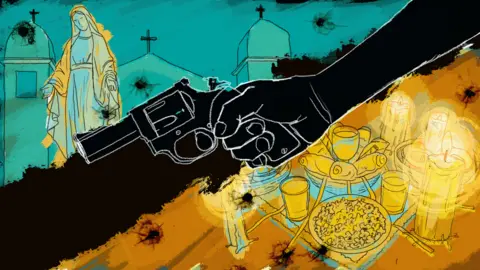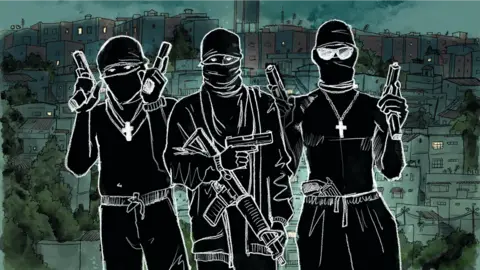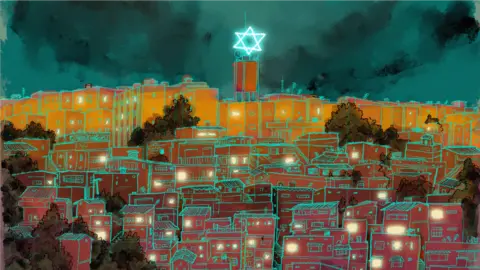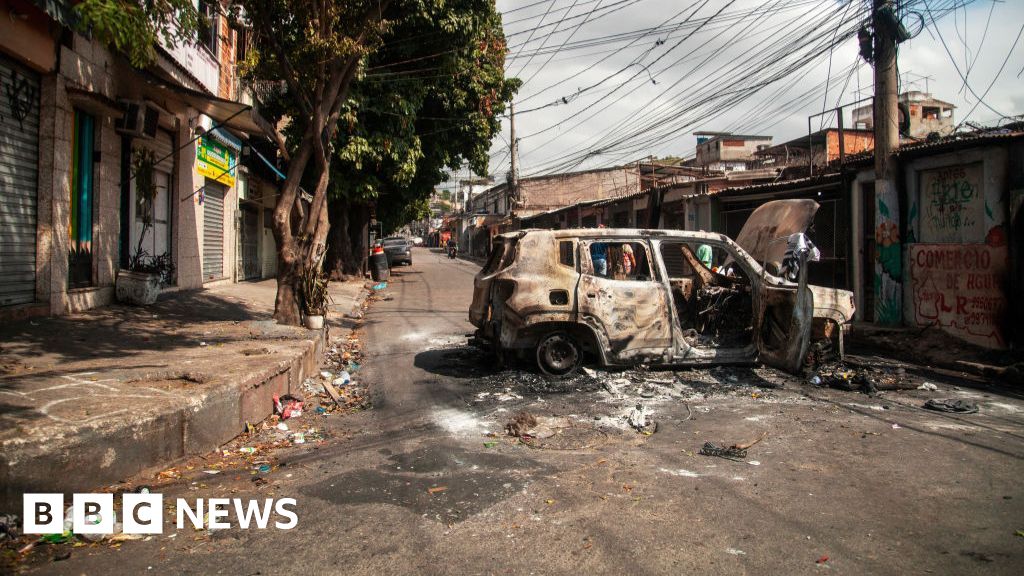 Daniel Arce-Lopez/BBC
Daniel Arce-Lopez/BBCWhen police in Rio de Janeiro seize blocks of cocaine and bundles of marijuana they may well find them branded with a religious symbol – the Star of David. This is not a reference to the Jewish faith, but to the belief of some Pentecostal Christians that the return of Jews to Israel will lead to the Second Coming of Christ.
The gang selling these branded drugs is the Pure Third Command, one of Rio’s most powerful criminal groups, with a reputation both for making its opponents disappear, and for fanatical evangelical Christianity.
They took control of a group of five favelas in the north of the city – now known as the Israel Complex – after one of their leaders had what he believed was a revelation from God, says theologian Vivian Costa, author of the book, Evangelical Drug Dealers.
She says the gangsters see themselves as “soldiers of crime”, with Jesus as “the owner” of the territory they dominate.
Controversially, some have dubbed them “Narco-Pentecostals”.
A rifle and the Bible
One man who has experience of crime and religion – though in his case, not at the same time – is Pastor Diego Nascimento, who became a Christian after hearing the gospel from a gangster holding a gun.
Looking at him, it’s hard to believe that this boyish looking 42-year-old Wesleyan Methodist minister with a ready smile and dimples, was once a member of Rio’s notorious Red Command crime gang and managed its activities in the city’s Vila Kennedy favela.
Four years in prison for drug dealing weren’t enough to make him give up crime. But when he became addicted to crack cocaine his standing in the gang plummeted.
“I lost my family. I practically lived on the street for almost a year. I went so far as to sell things from my house to buy crack,” he says.
It was at that point, when he was at rock bottom, that a well-known drug dealer in the favela summoned him.
“He started preaching to me, saying there was a way out, that there was a solution for me, which was to accept Jesus,” he recalls.
The young addict took this advice and began his journey to the pulpit.
Pastor Nascimento still spends time with criminals, but now it is through his work in prisons, where he helps people turn their lives around, as he did himself.
Despite having been converted by a gangster, he regards the idea of religious criminals as a contradiction in terms.
“I don’t see them as evangelical believers,” he says.
“I see them as people who are going down the wrong path and have a fear of God because they know that God is the one who guards their lives.
“There is no such thing as combining the two, being an evangelical and a thug. If a person accepts Jesus and follows the Biblical commandments, that person cannot be a drug dealer.”
 Daniel Arce-Lopez/BBC
Daniel Arce-Lopez/BBC‘Living under siege’
Evangelical Christianity will, by some predictions, overtake Catholicism as Brazil’s biggest religion by the end of the decade.
As it has grown, the charismatic Pentecostal movement has particularly resonated with people living in the gang-ridden favelas, and now some of those gangs are drawing on elements of the faith they grew up with to wield power.
One accusation made against them is that they are using violence to suppress Afro-Brazilian faiths.
Christina Vital, a sociology professor at Rio’s Fluminense Federal University, says Rio’s poor communities have long been living “under siege” from criminal gangs, and this is now affecting their freedom of religion.
“In the Israel Complex, people with other religious beliefs cannot be seen to practise them publicly. It’s not an exaggeration to speak of religious intolerance in that territory.”
Vital says Afro-Brazilian Umbanda and Candomblé religious houses have been shut down in surrounding neighbourhoods too, with gangsters sometimes drawing messages on the walls such as “Jesus is the Lord of this place.”
Followers of Afro-Brazilian faiths have long faced prejudice, and drug dealers are not the only people who have targeted them.
But Dr Rita Salim, who heads the Rio police Department for Racial and Intolerance Crimes, says threats and attacks by narco-gangs have a particularly powerful impact.
“These cases are more serious because they are imposed by a criminal organisation, by a group and its leader, who imposes fear on the whole territory it dominates.”
She notes that an arrest warrant has been issued for the man thought to be the number one crime boss in the Israel Complex, for allegedly ordering armed men to attack an Afro-Brazilian temple in another favela.
 Daniel Arce-Lopez/BBC
Daniel Arce-Lopez/BBC‘Neo-crusade’
While allegations of religious extremism in Rio’s favelas first gained attention in the early 2000s, the problem has “increased dramatically” in recent years, according to Marcio de Jagun, co-ordinator of Religious Diversity at Rio’s City Hall.
Jagun, who is a babalorixá (high priest) of the Candomblé religion, says the issue is now a national one, with similar attacks seen in other Brazilian cities.
“This is a form of neo-Crusade,” he says. “The prejudice behind these attacks is both religious and ethnic, with outlaws demonising religions from Africa and claiming to banish evil in the name of God.”
But religion and crime have long been intertwined in Brazil, says theologian Vivian Costa. In the past, gangsters would ask for protection from Afro-Brazilian deities and Catholic saints.
“If we look at the birth of the Red Command, or the birth of the Third Command, Afro religions [and Catholicism] have been there since their beginning. We see the presence of Saint George, the presence of [the Afro-Brazilian god] Ògún, the tattoos, the crucifixes, the candles, the offerings.
“That is why to call it Narco-Pentecostalism is to reduce that relationship that is so historic and traditional between crime and religion. I prefer to call it ‘Narco-Religiosity’.”
Whatever one calls this mix of faith and criminality, one thing seems clear: it jeopardises a right that is enshrined in Brazil’s constitution – that of religious freedom.
And it is yet one more way in which violent drug traffickers cause harm to the communities forced to live under their rule.



